Christine Valters Paintner's Blog, page 76
September 28, 2019
Monk in the World: Hospitality 4 ~ Guided Meditation from Christine (with AUDIO MP3)~ A Love Note from Your Online Abbess
Dearest monks, artists, and pilgrims,
During this Jubilee year of sabbatical we are revisiting our Monk Manifesto by moving slowly through the Monk in the World retreat materials together every Sunday. Each week will offer new reflections on the theme and every six weeks will introduce a new principle.
Principle Two: I commit to radical acts of hospitality by welcoming the stranger both without and within. I recognize that when I make space inside my heart for the unclaimed parts of myself, I cultivate compassion and the ability to accept those places in others.
https://abbeyofthearts.com/blog/wp-content/uploads/2019/09/2-Hospitality-Monk-in-the-World-Welcoming-Prayer.mp3
 This practice of Welcoming Prayer was originally developed by Contemplative Outreach's late master teacher Mary Mrozowski, it is based largely on the teaching and wisdom of Fr. Thomas Keating and an eighteenth century work titled Abandonment to Divine Providence by Jean Pierre de Caussade.
This practice of Welcoming Prayer was originally developed by Contemplative Outreach's late master teacher Mary Mrozowski, it is based largely on the teaching and wisdom of Fr. Thomas Keating and an eighteenth century work titled Abandonment to Divine Providence by Jean Pierre de Caussade.
I will give you a brief overview of the practice and then suggest you move through the experience in your own time and pace.
There are three main movements to the process of the Welcoming Prayer
Focus and sink in
Welcome
Let go
We begin the practice by allowing some time to move your focus and attention to your body. Allow some time to breathe and connect with what you are experiencing. Notice both physical pain as well as emotions. Bring your full awareness to whatever the experience is, without trying to change it. Notice how you experience this in your body. If you feel sad, how is that manifested in your body?
Don't try to change anything. Just stay present.
Focusing doesn't mean psychoanalyzing. This is not about trying to discover why you feel the way you do, or justifying your feelings.
This first step is the key to whole practice. By becoming physically aware of this energy as sensation in your body, you can stay in the present, welcoming it which is the second movement.
When you feel fully immersed in the feeling or experience, you begin to practice this inner hospitality and say very gently: "Welcome, anger" or "Welcome pain, welcome."
The goal of this practice isn't to get rid of the experience you're having, but to not let it take your awareness from being fully present to yourself and this moment.
What often happens is that we experience something we consider "negative" and then we begin to immediately resist the feeling. We may distract ourselves or try to figure out what is wrong. But these responses simply move us further away from an experience of this moment in time.
By embracing the thing you once defended yourself against, or ran from, you are actually disarming it, removing its power to hurt you or chase you back into our smaller self. You open yourself to hear the wisdom it might have to offer, to reveal what it is trying to say to you.
When we bring ourselves fully present to our experience, a remarkable thing happens. We find the courage and strength to stay with the moment. We surrender the desires of the small self to the capacity of the true or authentic self, the inner witness I discussed in part one. The authentic self already has a connection to the divine, and is able to be fully present to whatever is happening from a place of calm and compassion. You can stay with your experience no matter its physical or psychological impact.
In this practice we stay present, welcoming it in, but don't identify it. We come to recognize that this experience doesn't define the whole of who we are. We are not made up entirely of our grief just as we are not fully defined by joy.
This act of welcome isn't about condoning the situation that caused the physical or emotional pain. Surrender isn't about accepting illness or rejection or pain inflicted by another as somehow just the way life is. You are welcoming in the feelings the experience triggers for you and letting them have some space within. This is surrender as an inner attitude rather than outer practice. Sometimes the events of our lives demand our resistance, sometimes we are called to say no. But the feelings we experience, these need room within our inner guest house because paradoxically it is only by inviting them in that we are no longer controlled by them. Once you are in right alignment with your inner experience, then you can discern freely how to respond to the outside world of experience. You choose from a place of centeredness and consciousness rather than reactivity.
The third step is letting go, but the temptation might be to move here too quickly. The real work of Welcoming Prayer is in those first two steps, staying with the experience and welcoming it in until the wall of resistance begins to come down on its own. When you feel this inner fighting of the experience dissolve, then you can begin to practice letting go. This is just for now, because as human beings we will continue to encounter the difficult emotions. This is not a final, forever renunciation of your anger or fear; it's simply a way of gently waving farewell as the emotion starts to recede.
If you feel resistance to the letting go, don't pretend, simply accept where you are right now and bring some compassion to yourself.
To let go you might say something simple like I let go of my anger and give it over to God.
The creator of the Welcoming Prayer used this prayer:
I let go my desire for security and survival.
I let go my desire for affection and esteem
I let go my desire for control and power.
I let go my desire to change the situation.
When my inner experience is welcomed in, God can transform it for my own deepening.
If we practice this regularly you might begin to notice that throughout your day there are moments when an inner experience arises that you want to resist. You can simply bring your compassionate awareness to this process and instead of distracting yourself from the feeling, simply pray the word "welcome" and allow the divine compassion to flow through you, offering the gift of transforming grace.
Welcoming prayer helps us to cultivate our ability to live with the truth of this moment, and to accept whatever is happening right now.
Take some time right now, begin with a few minutes. Focus on what you are experiencing without changing it. Once you name the feeling, Welcome it in. Stay with it as long as you need to, seeing if you can simply accept this as the truth of your life in this moment. Then when you feel a bit of release around your resistance, practice letting go, not holding on to whatever this was, knowing that each moment brings its own grace and truth.
Blessings as you go forward with inner hospitality.
With great and growing love,
Christine
Christine Valters Paintner, PhD, REACE
September 24, 2019
Featured Poet: Susan Miller
Last spring we launched a series with poets whose work we love and want to feature and will continue it moving forward.
Our next poet is Susan Miller, whose work is inspired by the sacred in relationship. Read her poetry and discover more about the connections she makes between poetry and the sacred.
Et In Arcadia Ego
For Anya Krugovoy Silver
Yesterday a new Tom Waits song
was released, and I thought
of you. In a different world
we would have met up this October,
our heads together over a cafe table,
and we could have sung it
like schoolgirls singing the anthem
of their country--not Russia,
not America, but the country of those
who joke about death and carry
a St. Agatha prayer-card wherever
they go. In April your hair
was growing back, and you wore
red and black earrings that swung
like pendulums over our lunch.
You ordered a giant cup of coffee.
I ordered a giant sugar bomb.
The sun warmed our walk
through Central Park, and we linked arms
talking about how much making out
is okay for a 14-year-old, being moms.
It was and was not an ordinary day.
Now I am the only one
who remembers how slowly we walked,
how I returned you to the apartment
because you feared
getting dizzy alone.
I've been trying to pray more,
reading your poems.
I painted my nails red
because of you, letting the chips show.
I walk through the house, wishing
you would haunt me the way you said
your dead friends would sit with you
during chemo. One more time
I would sing to you bella ciao, bella ciao,
bella ciao.
Originally published in Presence: A Journal of Catholic Poetry, 2019
Themes of Her Work
My main theme currently--in just about every aspect of my life--is grief. In the past six years I've lost a number of deeply beloved friends, including my official sponsor for conversion to Catholicism, my unofficial sponsor for conversion, one of my early mentors in poetry, one of my most recent mentors in poetry, and my grandmother. I've spent the entire last year in rumination. I haven't been writing so much as preparing to write--I'll be traveling to Mexico this summer to start a book of essays about death in Mexican art and culture. I expect poetry will follow as well.
Poetry and the Sacred
Poetry, like all acts of witness, allows the reader to enter into another's perspective. Reading poetry can help develop empathy and a deeper communion with others. If there is anything that brings me closer to the sacred, it's the effort to grow closer to other human beings. I often write poetry because my reading inspires that impulse. I'm not always in touch with my faith; my mind is likely to be distracted or cloudy. But reading (and I'm a reader first) can center me again, because I'm asking questions and trying to enter into some kind of wisdom. In my twenties, I spent a year reading Ecclesiastes everywhere--on the subway, in my room, at lunch, between classes. I read it because I needed it. It wasn't just because it was the Bible--it seemed to hold both sensuous music and sere truths, a poetry that was totally dire but would inevitably seduce you anyway. Artists I admire often tell difficult truths in beautiful ways--Colette, Gwendolyn Brooks, Eliot Weinberger, Elizabeth Bishop, Anthony Hecht, Denis Johnson, Anya Krugovoy Silver, George Saunders, Sturgill Simpson, Mark Doty, Werner Herzog, Tom Waits, Marie Ponsot, Jerry Harp, Yehoshua November… plus the usual suspects (Hopkins, O'Connor.)

A Vision
Last night I dreamed the church in winter.
Crowds of people filled the pews, laden
with armloads of roses and larkspur,
each with a tray of lit candles. St. Claire
loosened all her blonde hair in a pew
in the front of the sanctuary, and I knew
St. Francis nestled between friends somewhere.
The priest told us In this dark hour of the year
we light candles to dispel the vision of evil,
which shadows us whenever we forget to turn
towards the light.Directly I could feel
beside me the grey one on his ashen horse,
his face obscured under his tattered hood,
and felt the wind of his galloping, but
my candle's flame did not flicker.
You must make your own light, the Father said,
and as I raised my head I saw every man
and woman, every child, clean and naked,
brighter than the glow of a thousand candles.
Originally published in Spiritus: A Journal of Christian Spirituality, Vol. 16, No. 1, Spring 2016, and in Communion of Saints.
About Susan Miller
Susan L. Miller is the author of Communion of Saints: Poems (Paraclete Press.) She has twice received Dorothy Sargent Rosenberg Prizes for poetry, and has poems in Collective Brightness: LGBTIQ Poets on Faith, Religion, and Spirituality (Sibling Rivalry Press) and St. Peter's B-List: Contemporary Poems Inspired by the Saints (Ave Maria Press.) Her poems have been published in Commonweal, Black Warrior Review, Meridian, Iowa Review, Los Angeles Review, Image, Presence: A Journal of Catholic Poetry, and other literary journals. Essays have been published on the Sick Pilgrim blog. Because she is a student of Marie Ponsot, she has also had poems published in several volumes of Still Against War. She teaches at Rutgers University, New Brunswick, and lives in Brooklyn with her family.
Recent Articles:
The Catholic Imagination: What's Actually on Display in the Met's Heavenly Bodies Exhibit, Part I
Dress Like a Saint: What's Actually on Display in the Met's Heavenly Bodies Exhibit, Part II
Vatican Treasures: What's Actually on Display in the Met's Heavenly Bodies Exhibit, Part III
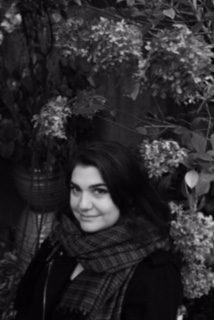
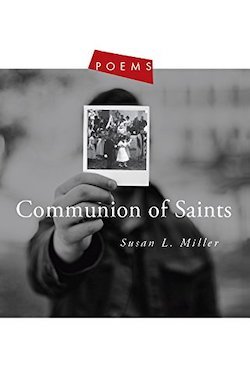
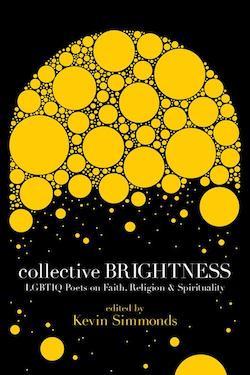
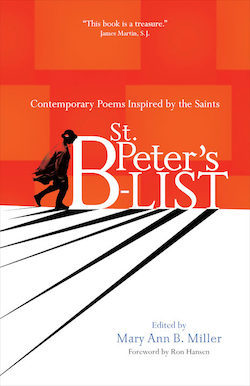

Dreaming of Stones
Christine Valters Paintner's new collection of poems Dreaming of Stones has just been published by Paraclete Press.
The poems in Dreaming of Stones are about what endures: hope and desire, changing seasons, wild places, love, and the wisdom of mystics. Inspired by the poet's time living in Ireland these readings invite you into deeper ways of seeing the world. They have an incantational quality. Drawing on her commitment as a Benedictine oblate, the poems arise out of a practice of sitting in silence and lectio divina, in which life becomes the holy text.
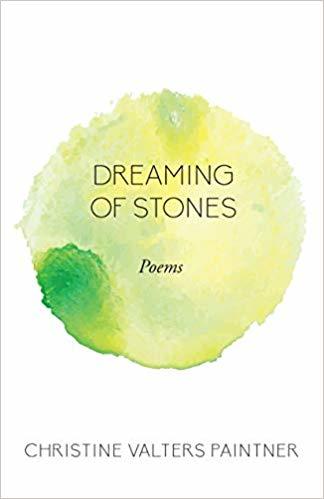
September 21, 2019
Monk in the World: Hospitality 3 – Reflection by Christine + AUDIO ~ A Love Note from Your Online Abbess
Dearest monks, artists, and pilgrims,
During this Jubilee year of sabbatical we are revisiting our Monk Manifesto by moving slowly through the Monk in the World retreat materials together every Sunday. Each week will offer new reflections on the theme and every six weeks will introduce a new principle.
Principle Two: I commit to radical acts of hospitality by welcoming the stranger both without and within. I recognize that when I make space inside my heart for the unclaimed parts of myself, I cultivate compassion and the ability to accept those places in others.
https://abbeyofthearts.com/blog/wp-content/uploads/2019/09/2-Monk-in-the-World-Hospitality.mp3
 St. Benedict in chapter 53 of his Rule writes:
St. Benedict in chapter 53 of his Rule writes:
All guests who present themselves are to be welcomed as Christ,
for he himself will say: I was a stranger and you welcomed me (Matt 25:35).
The core of this idea was that everyone who comes to the door of the monastery, and by extension the door of our lives—the poor, the traveler, those of a different religion, social class, or education — should be welcomed in, not just as an honored guest, but as a revelation of the sacred. For Benedict, our encounter with the stranger – the unknown, the unexpected, the foreign elements that spark our fear – are precisely the places where we are most likely to encounter God. This is a practice of outer hospitality.
There is another dimension to this practice that we sometimes might be tempted to forget, which is inner hospitality. Within each of us we have a multitude of feelings, experiences, inner selves, that we would prefer to close the door on. We have many inner strangers knocking at the door of our hearts. How many times have I refused to welcome in grief or anger, the scary new dream, the part of myself that doesn't seem to fit with the others?
Becoming a monk in the world means cultivating the ability to welcome in the whole spectrum of our inner experience and develop compassion for all the parts of ourselves. When we are able to embrace all of who we are, we are far more likely able to welcome in what is strange or uncomfortable in others.
We each contain a Self with the capital S, which is the true heart of who we are, beneath all of the roles and identities we play. It is sometimes called the inner witness, and is that place within us that can calmly observe what happens within us and can be with the thoughts that come up and the stories we tell ourselves. The witness brings curiosity and compassion. In religious traditions the mystics tell us this is the place where we encounter the divine within.
The early desert monks would say "Go, sit in your cell, and your cell will teach you everything." The cell is both an internal and external place. We carry our monastic cell with us everywhere we go. It is a symbol for the place within our hearts where we wrestle with our inner struggles and encounter God's presence in the midst of the wrestling.
In the desert tradition, when we enter the cave of our heart we encounter the passions which might also be described as habits of being which developed from a core wound, often from childhood. These wounds distort the reality of who we are and lead us to compulsive acts. They need to be tended and healed which is challenging because they connect us to our deepest vulnerability. In one strand of the desert tradition, passions were viewed as something negative, to be eradicated from the soul, and we sometimes read about the language of doing battle with them.
However, the dominant teaching for the desert mothers and fathers was that the passions were considered something positive – natural and neutral impulses whose source is God, but in our human efforts to suppress them their energy becomes misdirected. Some of the language used is "knowing the passions" where knowing means loving and embracing, the goal is to illumine them, rather than eliminate them; we don't seek to destroy them, but figure them.
One of the desert fathers, Abba Isaiah claims that all of the passions including anger, jealousy, and lust are given to us by God with a particular and sacred purpose. Coming to know these passions, how they were formed, and what they desire, is a healing experience. We begin to reclaim all the parts of ourselves in the service of wholeness.
This is a quote from John Chryssavgis from his book In the Heart of the Desert:
"If God is right there in the midst of our struggle, then our aim is to stay there. We are to remain in the cell, to stay on the road, not to forego the journey or forget the darkness. It is all too easy for us to overlook the importance of struggle, preferring instead to secure peace and rest, or presuming to reach the stage of love prematurely. It is always easier to allow things to pass by, to go on without examination and effort. Yet, struggling means living. It is a way of fully living life and not merely observing it. It takes much time and a great effort to unite the disparate, disjointed, and divided parts of the self into an integrated whole. During this time and in this effort, the virtue of struggle was one of the non-negotiables in the spiritual way of the desert. The Desert Fathers and Mothers speak too us with authority, because they are in fact our fellow travelers. They never claim to have arrived, they never indicate having completed the journey."
This practice of inner hospitality means welcoming in whatever it is we are experiencing as having the possibility of wisdom for us. Hospitality is a lifetime journey, we don't one day figure it out and no longer have to struggle with our impulses and desires. But we can learn not to resist them and find ways to enter into dialogue with them so we deepen and grow into spiritual maturity.
In the monastic tradition there is a commitment to conversion which means that we recognize that we are always on the way, that we have never fully arrived. The temptation of the spiritual life is to avoid pain, to believe that being "spiritual" means always being full of peace and grace when in fact the whole teaching of the desert tradition focuses on the need to stay fully present to the often challenging and painful internal dynamics that happen within us.
How do you welcome in the range of your feelings without being swept away by them? One way to do this is by cultivating your inner witness and connecting regularly with your calm, non-anxious, compassionate core Self. Meditation practice can nurture our ability to sit and observe the rise and fall of our inner lives without resisting or seizing any particular moment. When we offer ourselves the space to simply be with whatever is happening inside, without judgment, we begin to see that each of those feelings passes with time. Through art and journaling we can engage in an active dialogue with these parts of ourselves we find threatening or depleting.
The guided meditation for this principle which we'll explore next week introduces a prayer form called welcoming prayer in which you practice noticing when you resist an inner voice or shut your inner door on it, take some time to intentionally invite this voice inside to the table. Ask it what it has come to tell you. Listen past the first layer which may sound ugly or painful and tend to the deeper layers underneath. This takes time, much like growing in intimacy with a friend. Our rejected selves will need some coaxing.
When we choose to receive guests as a window into the sacred presence, we are choosing to live and relate from a more intentional and reverential place. We have practiced being present to the sacred in each hour and each object around us, now we bring that attention even more consciously within. When we engage in a dynamic encounter with what we are fearful of, it releases its power on us and new wisdom and energy is released. It is in this place of hospitality to the unknown where we encounter God.
Pay attention to the feelings and experiences inside of you that you want to reject. Becoming a monk in the world means honoring these as gifts and treasures for our spiritual ripening. And most important of all, keep showing up to practice.
With great and growing love,
Christine
Christine Valters Paintner, PhD, REACE
Photo© Christine Valters Paintner
Monk in the World: Hospitality 1 – Reflection by Christine + AUDIO ~ A Love Note from Your Online Abbess
Dearest monks, artists, and pilgrims,
During this Jubilee year of sabbatical we are revisiting our Monk Manifesto by moving slowly through the Monk in the World retreat materials together every Sunday. Each week will offer new reflections on the theme and every six weeks will introduce a new principle.
Principle Two: I commit to radical acts of hospitality by welcoming the stranger both without and within. I recognize that when I make space inside my heart for the unclaimed parts of myself, I cultivate compassion and the ability to accept those places in others.
https://abbeyofthearts.com/blog/wp-content/uploads/2019/09/2-Monk-in-the-World-Hospitality.mp3
 St. Benedict in chapter 53 of his Rule writes:
St. Benedict in chapter 53 of his Rule writes:
All guests who present themselves are to be welcomed as Christ,
for he himself will say: I was a stranger and you welcomed me (Matt 25:35).
The core of this idea was that everyone who comes to the door of the monastery, and by extension the door of our lives—the poor, the traveler, those of a different religion, social class, or education — should be welcomed in, not just as an honored guest, but as a revelation of the sacred. For Benedict, our encounter with the stranger – the unknown, the unexpected, the foreign elements that spark our fear – are precisely the places where we are most likely to encounter God. This is a practice of outer hospitality.
There is another dimension to this practice that we sometimes might be tempted to forget, which is inner hospitality. Within each of us we have a multitude of feelings, experiences, inner selves, that we would prefer to close the door on. We have many inner strangers knocking at the door of our hearts. How many times have I refused to welcome in grief or anger, the scary new dream, the part of myself that doesn't seem to fit with the others?
Becoming a monk in the world means cultivating the ability to welcome in the whole spectrum of our inner experience and develop compassion for all the parts of ourselves. When we are able to embrace all of who we are, we are far more likely able to welcome in what is strange or uncomfortable in others.
We each contain a Self with the capital S, which is the true heart of who we are, beneath all of the roles and identities we play. It is sometimes called the inner witness, and is that place within us that can calmly observe what happens within us and can be with the thoughts that come up and the stories we tell ourselves. The witness brings curiosity and compassion. In religious traditions the mystics tell us this is the place where we encounter the divine within.
The early desert monks would say "Go, sit in your cell, and your cell will teach you everything." The cell is both an internal and external place. We carry our monastic cell with us everywhere we go. It is a symbol for the place within our hearts where we wrestle with our inner struggles and encounter God's presence in the midst of the wrestling.
In the desert tradition, when we enter the cave of our heart we encounter the passions which might also be described as habits of being which developed from a core wound, often from childhood. These wounds distort the reality of who we are and lead us to compulsive acts. They need to be tended and healed which is challenging because they connect us to our deepest vulnerability. In one strand of the desert tradition, passions were viewed as something negative, to be eradicated from the soul, and we sometimes read about the language of doing battle with them.
However, the dominant teaching for the desert mothers and fathers was that the passions were considered something positive – natural and neutral impulses whose source is God, but in our human efforts to suppress them their energy becomes misdirected. Some of the language used is "knowing the passions" where knowing means loving and embracing, the goal is to illumine them, rather than eliminate them; we don't seek to destroy them, but figure them.
One of the desert fathers, Abba Isaiah claims that all of the passions including anger, jealousy, and lust are given to us by God with a particular and sacred purpose. Coming to know these passions, how they were formed, and what they desire, is a healing experience. We begin to reclaim all the parts of ourselves in the service of wholeness.
This is a quote from John Chryssavgis from his book In the Heart of the Desert:
"If God is right there in the midst of our struggle, then our aim is to stay there. We are to remain in the cell, to stay on the road, not to forego the journey or forget the darkness. It is all too easy for us to overlook the importance of struggle, preferring instead to secure peace and rest, or presuming to reach the stage of love prematurely. It is always easier to allow things to pass by, to go on without examination and effort. Yet, struggling means living. It is a way of fully living life and not merely observing it. It takes much time and a great effort to unite the disparate, disjointed, and divided parts of the self into an integrated whole. During this time and in this effort, the virtue of struggle was one of the non-negotiables in the spiritual way of the desert. The Desert Fathers and Mothers speak too us with authority, because they are in fact our fellow travelers. They never claim to have arrived, they never indicate having completed the journey."
This practice of inner hospitality means welcoming in whatever it is we are experiencing as having the possibility of wisdom for us. Hospitality is a lifetime journey, we don't one day figure it out and no longer have to struggle with our impulses and desires. But we can learn not to resist them and find ways to enter into dialogue with them so we deepen and grow into spiritual maturity.
In the monastic tradition there is a commitment to conversion which means that we recognize that we are always on the way, that we have never fully arrived. The temptation of the spiritual life is to avoid pain, to believe that being "spiritual" means always being full of peace and grace when in fact the whole teaching of the desert tradition focuses on the need to stay fully present to the often challenging and painful internal dynamics that happen within us.
How do you welcome in the range of your feelings without being swept away by them? One way to do this is by cultivating your inner witness and connecting regularly with your calm, non-anxious, compassionate core Self. Meditation practice can nurture our ability to sit and observe the rise and fall of our inner lives without resisting or seizing any particular moment. When we offer ourselves the space to simply be with whatever is happening inside, without judgment, we begin to see that each of those feelings passes with time. Through art and journaling we can engage in an active dialogue with these parts of ourselves we find threatening or depleting.
The guided meditation for this principle which we'll explore next week introduces a prayer form called welcoming prayer in which you practice noticing when you resist an inner voice or shut your inner door on it, take some time to intentionally invite this voice inside to the table. Ask it what it has come to tell you. Listen past the first layer which may sound ugly or painful and tend to the deeper layers underneath. This takes time, much like growing in intimacy with a friend. Our rejected selves will need some coaxing.
When we choose to receive guests as a window into the sacred presence, we are choosing to live and relate from a more intentional and reverential place. We have practiced being present to the sacred in each hour and each object around us, now we bring that attention even more consciously within. When we engage in a dynamic encounter with what we are fearful of, it releases its power on us and new wisdom and energy is released. It is in this place of hospitality to the unknown where we encounter God.
Pay attention to the feelings and experiences inside of you that you want to reject. Becoming a monk in the world means honoring these as gifts and treasures for our spiritual ripening. And most important of all, keep showing up to practice.
With great and growing love,
Christine
Christine Valters Paintner, PhD, REACE
Photo© Christine Valters Paintner
September 17, 2019
Monk in the World Guest Post: Celeste Boudreaux
I am delighted to share another beautiful submission to the Monk in the World guest post series from the community. Read on for Celeste Boudreaux's reflection "Healing Art."
 For Celeste
For Celeste
I see you, though you try to hide
Blending into the wall
Daughter of a defective mother
(Whose empty eyes betray her lipstick toothed smile)
You lurk in the corner, timid and sad and skinny
Child of a deceptive poverty
Cinderella's colorless little sister
Dwelling in the big house, eating ashes
Bearing in silence your public shame and private anguish
Called to be the strong one, the good one
Who needs nothing, demands nothing, receives nothing
Mother's caretaker during her final years
Of agonizing unraveling
Forgive those who looked away in discomfort
Who did nothing, made no inquires
Waited until after the final, successful disaster
To offer any help
For I see you
And I'm telling you
I see a brave and resilient child
Not needless, but worthy of compassion
Not invisible, but beautiful with color and texture
Not deserted, but secretly upheld
Not unscarred, but admirably capable of growth
Sweet girl
Unfold a little
Relax, smile, be silly
Receive my love
Accept these tender tears
You will not slide into the abyss
Because I will hold you tight
On Good Friday, 1975, when I was 16, I came home from my after school job and found my mother's body. She had attempted suicide twice before. Before I had left for my after school job, she had said goodbye to me at the front door to the apartment, and now she was laid out on the bed not breathing.
Naturally, this was a defining trauma of my life, but it was merely the culmination of a childhood of pain and deprivation. After my parents' divorce, my stern grandmother had taken charge and imposed her harsh discipline on me and my five siblings.
When I was 13, our family was broken up again, and my uncles put me in an apartment with my mother. Now I had to become the mom, doing the cooking and grocery shopping and worrying about paying the bills. My tortured mother swirled within the vortex of her own inner turmoil, swinging between extreme agitation and debilitating depressions, until that terrible Friday.
As an adult, I staved off my own depression by maintaining a discipline of positivity, denying my own pain. I had internalized my grandmother's relentless standards and productivity ethic. This served me well until I found myself flat on my back with a tangle of health problems made substantially worse by extreme stress, overwork, and debilitating anxiety.
 At this point of desperation, God began to lead me on a path of healing through art. I started drawing simple pictures of me as a little girl and Jesus as my father: rocking in his lap; twirling myself dizzy and landing in his outstretched arms; sitting cross-legged in a field weaving a clover flower crown as he sits nearby, smiling as he watches me play. I drew all the tender interactions that I missed during my girlhood, the moments that would have told me that I was a much loved and cherished child, that I had permission to play and express joy, and that he delighted in me just being myself. Drawing these pictures was a kind of meditation, a way of spending time with those images, of transforming them by some strange alchemy into the reality of memory, and thus starting to heal my little girl's heart.
At this point of desperation, God began to lead me on a path of healing through art. I started drawing simple pictures of me as a little girl and Jesus as my father: rocking in his lap; twirling myself dizzy and landing in his outstretched arms; sitting cross-legged in a field weaving a clover flower crown as he sits nearby, smiling as he watches me play. I drew all the tender interactions that I missed during my girlhood, the moments that would have told me that I was a much loved and cherished child, that I had permission to play and express joy, and that he delighted in me just being myself. Drawing these pictures was a kind of meditation, a way of spending time with those images, of transforming them by some strange alchemy into the reality of memory, and thus starting to heal my little girl's heart.
One day as I struggled with my anxiety, I was inspired to write a lullaby, as if Jesus my father was singing it to my toddler self, crying hysterically in my crib. "Sweet little baby girl," he sang, "Daddy's here…you are heard, never fear." Later, I wrote "For Celeste," a poem to my teen self. It seemed that God was leading me to speak the language of my child self at different ages: a lullaby to comfort a baby, drawings for a young girl, and now a poem for a teen who had written poetry at that age so long ago.
Recently, I have begun making collages that express aspects of myself, such as The Good Little Girl, pictured at the beginning. I expected that I would be done with it by now, but I have found that deep healing comes in stages, one layer at a time.
As a monk in the world, I am learning that I can only truly know and love God in proportion to how well I know and love myself. If I do not extend to myself the grace and compassion that he extends to me, then I will not be able to be present to others in a deep and meaningful way.
I close with a poem for all those who have walked through pain and disillusionment away from a broken ideal towards a more humble and graced reality.
Eve's Journey
Exiled from the garden of perfection
I journey on my forced march
Fearful and desperate
Searching, clutching, clinging
For any bit of comfort and control
Hiding in loneliness and sorrow
Learning to bury it deeply, deeply
And soldier on in pride of self reliance
Teased and blessed by glimpses of glory
Amidst the mustiness of decay
I catch a whiff of honeysuckle
Lost Eden peeks through a fallen world
Can I say yes to both pain and beauty
Is less than perfect good enough
Does God hold more dear the broken and mending heart
 Celeste Boudreaux lives in Houston, Texas. In addition to her day job as a university administrator, she is a spiritual director and one who sees beauty and expresses it through photography, painting, drawing and poetry. She also loves yoga, walks in nature, and butterfly gardening.
Celeste Boudreaux lives in Houston, Texas. In addition to her day job as a university administrator, she is a spiritual director and one who sees beauty and expresses it through photography, painting, drawing and poetry. She also loves yoga, walks in nature, and butterfly gardening.
September 14, 2019
Monk in the World: Hospitality 2 – Scriptural Reflection by John – A Note from Your Online Prior
 Dearest monks, artists, and pilgrims,
Dearest monks, artists, and pilgrims,
During this Jubilee year of sabbatical we are revisiting our Monk Manifesto by moving slowly through the Monk in the World retreat materials together every Sunday. Each week will offer new reflections on the theme and every six weeks will introduce a new principle.
Principle Two: I commit to radical acts of hospitality by welcoming the stranger both without and within. I recognize that when I make space inside my heart for the unclaimed parts of myself, I cultivate compassion and the ability to accept those places in others.
Genesis 18:1-15
A Son Promised to Abraham and Sarah
The LORD appeared to Abraham by the oaks of Mamre, as he sat at the entrance of his tent in the heat of the day. He looked up and saw three men standing near him. When he saw them, he ran from the tent entrance to meet them, and bowed down to the ground. He said, 'My lord, if I find favour with you, do not pass by your servant. Let a little water be brought, and wash your feet, and rest yourselves under the tree. Let me bring a little bread, that you may refresh yourselves, and after that you may pass on—since you have come to your servant.' So they said, 'Do as you have said.' And Abraham hastened into the tent to Sarah, and said, 'Make ready quickly three measures of choice flour, knead it, and make cakes.' Abraham ran to the herd, and took a calf, tender and good, and gave it to the servant, who hastened to prepare it. Then he took curds and milk and the calf that he had prepared, and set it before them; and he stood by them under the tree while they ate.
They said to him, 'Where is your wife Sarah?' And he said, 'There, in the tent.' Then one said, 'I will surely return to you in due season, and your wife Sarah shall have a son.' And Sarah was listening at the tent entrance behind him. Now Abraham and Sarah were old, advanced in age; it had ceased to be with Sarah after the manner of women. So Sarah laughed to herself, saying, 'After I have grown old, and my husband is old, shall I have pleasure?' The LORD said to Abraham, 'Why did Sarah laugh, and say, "Shall I indeed bear a child, now that I am old?" Is anything too wonderful for the LORD? At the set time I will return to you, in due season, and Sarah shall have a son.' But Sarah denied, saying, 'I did not laugh'; for she was afraid. He said, 'Oh yes, you did laugh.'
Background
When we first meet Abraham & Sarah, they are known as Abram & Sarai. They are Semitic nomads from near the ancient city of Ur. They receive a call from God to travel west to a new land, where by virtue of their relationship with this God, they will be the foundation for a great nation.
It's a great leap of faith for the couple to trust this new God's promises. And yet, they go. Abram takes just not his wife, but their flocks and servants and Abram's nephew, Lot. Abram & Sarai have many adventures, both in getting to and living in the "Promised Land." It is years before God finally makes a formal covenant with them, where they are renamed Abraham & Sarah and God promises to give them so many decedents as to be near impossible to count.
Only it has been several years, Abraham & Sarah are still childless at 99 and 89 (respectively). Sarah, understandably grows impatient and takes matters into her own hands. She asks Abraham to take her handmaiden, Hagar, as a concubine to serve as a surrogate mother. Abraham agrees and Ishmael is born. Unfortunately, marital tension also entered the family at this point and Abraham & Sarah are anything but kind to the new mother and child.
Oddly enough, it is at one of the lowest points in the personal journeys of Abraham & Sarah that God reappears to once again offer promise and blessing to the couple who so recently proved less than worthy. But when the three strangers (angels in disguise) visit Abraham & Sarah, it is an opportunity of redemption.
Abraham & Sarah go out of their way to offer hospitality to the strangers. They insist that the three stay with them. There is a frantic pass to the narrative where Abraham & Sarah hurry about preparing an impromptu banquet for the three strangers. This is the foundation of our faith at their best: sacrificing their time and treasure for the benefit of others, without expectation of reward.
And yet, they are rewarded. These messengers from heaven not only renew God's promise to Abraham & Sarah, but give a specific time line: Sarah will have a child in a year's time. (At 89, Sarah can't help but laugh out loud at the notion of getting pregnant and giving birth at her advanced years. This is why her son is named Isaac, or Laughter.)
Reflection
Christine and I have not been blessed with children. But we have been blessed with family. In particular, our parents cared and nurtured us. We grew up in loving, if at times strict homes. Our parents made sure we received excellent educations and supported us along our way to adulthood. And when they died, tragically young, we both inherited enough money to afford a good home of our own.
I don't say this to brag, in large part because I know we were fortunate. We moved to Seattle before the housing price boom and left just as it started taking off. And even though our parents died too young, they left us a bit of the financial rewards of their life's work.
We are extremely grateful for our home and so wish to share the blessing of its space with others. And so, our apartment in Galway (affectionately names 'An Nead' – Irish for 'The Nest') has become host to pilgrims and friends. Our Galway-based pilgrimages meet in our living room most evenings for the week to share reflections and insights with one another. Our kitchen/dining room has held many a dinner party for friends. Game nights and evenings with friends have burst over onto our terrace. Our home has also been a make-shift rehearsal space for many a theatrical production and a film set on more than one occasion.
As much of an introvert as I am, loving most to curl up on the couch in the evening with my wife and dog, some of my fondest memories over the past year or so has been watching pilgrims, artists, and friends mingle and play and relax in our home.
With great and growing love,
John
John Valters Paintner, MTS
Monk in the World: Hospitality 1 – Scriptural Reflection by John – A Note from Your Online Prior
 Dearest monks, artists, and pilgrims,
Dearest monks, artists, and pilgrims,
During this Jubilee year of sabbatical we are revisiting our Monk Manifesto by moving slowly through the Monk in the World retreat materials together every Sunday. Each week will offer new reflections on the theme and every six weeks will introduce a new principle.
Principle Two: I commit to radical acts of hospitality by welcoming the stranger both without and within. I recognize that when I make space inside my heart for the unclaimed parts of myself, I cultivate compassion and the ability to accept those places in others.
Genesis 18:1-15
A Son Promised to Abraham and Sarah
The LORD appeared to Abraham by the oaks of Mamre, as he sat at the entrance of his tent in the heat of the day. He looked up and saw three men standing near him. When he saw them, he ran from the tent entrance to meet them, and bowed down to the ground. He said, 'My lord, if I find favour with you, do not pass by your servant. Let a little water be brought, and wash your feet, and rest yourselves under the tree. Let me bring a little bread, that you may refresh yourselves, and after that you may pass on—since you have come to your servant.' So they said, 'Do as you have said.' And Abraham hastened into the tent to Sarah, and said, 'Make ready quickly three measures of choice flour, knead it, and make cakes.' Abraham ran to the herd, and took a calf, tender and good, and gave it to the servant, who hastened to prepare it. Then he took curds and milk and the calf that he had prepared, and set it before them; and he stood by them under the tree while they ate.
They said to him, 'Where is your wife Sarah?' And he said, 'There, in the tent.' Then one said, 'I will surely return to you in due season, and your wife Sarah shall have a son.' And Sarah was listening at the tent entrance behind him. Now Abraham and Sarah were old, advanced in age; it had ceased to be with Sarah after the manner of women. So Sarah laughed to herself, saying, 'After I have grown old, and my husband is old, shall I have pleasure?' The LORD said to Abraham, 'Why did Sarah laugh, and say, "Shall I indeed bear a child, now that I am old?" Is anything too wonderful for the LORD? At the set time I will return to you, in due season, and Sarah shall have a son.' But Sarah denied, saying, 'I did not laugh'; for she was afraid. He said, 'Oh yes, you did laugh.'
Background
When we first meet Abraham & Sarah, they are known as Abram & Sarai. They are Semitic nomads from near the ancient city of Ur. They receive a call from God to travel west to a new land, where by virtue of their relationship with this God, they will be the foundation for a great nation.
It's a great leap of faith for the couple to trust this new God's promises. And yet, they go. Abram takes just not his wife, but their flocks and servants and Abram's nephew, Lot. Abram & Sarai have many adventures, both in getting to and living in the "Promised Land." It is years before God finally makes a formal covenant with them, where they are renamed Abraham & Sarah and God promises to give them so many decedents as to be near impossible to count.
Only it has been several years, Abraham & Sarah are still childless at 99 and 89 (respectively). Sarah, understandably grows impatient and takes matters into her own hands. She asks Abraham to take her handmaiden, Hagar, as a concubine to serve as a surrogate mother. Abraham agrees and Ishmael is born. Unfortunately, marital tension also entered the family at this point and Abraham & Sarah are anything but kind to the new mother and child.
Oddly enough, it is at one of the lowest points in the personal journeys of Abraham & Sarah that God reappears to once again offer promise and blessing to the couple who so recently proved less than worthy. But when the three strangers (angels in disguise) visit Abraham & Sarah, it is an opportunity of redemption.
Abraham & Sarah go out of their way to offer hospitality to the strangers. They insist that the three stay with them. There is a frantic pass to the narrative where Abraham & Sarah hurry about preparing an impromptu banquet for the three strangers. This is the foundation of our faith at their best: sacrificing their time and treasure for the benefit of others, without expectation of reward.
And yet, they are rewarded. These messengers from heaven not only renew God's promise to Abraham & Sarah, but give a specific time line: Sarah will have a child in a year's time. (At 89, Sarah can't help but laugh out loud at the notion of getting pregnant and giving birth at her advanced years. This is why her son is named Isaac, or Laughter.)
Reflection
Christine and I have not been blessed with children. But we have been blessed with family. In particular, our parents cared and nurtured us. We grew up in loving, if at times strict homes. Our parents made sure we received excellent educations and supported us along our way to adulthood. And when they died, tragically young, we both inherited enough money to afford a good home of our own.
I don't say this to brag, in large part because I know we were fortunate. We moved to Seattle before the housing price boom and left just as it started taking off. And even though our parents died too young, they left us a bit of the financial rewards of their life's work.
We are extremely grateful for our home and so wish to share the blessing of its space with others. And so, our apartment in Galway (affectionately names 'An Nead' – Irish for 'The Nest') has become host to pilgrims and friends. Our Galway-based pilgrimages meet in our living room most evenings for the week to share reflections and insights with one another. Our kitchen/dining room has held many a dinner party for friends. Game nights and evenings with friends have burst over onto our terrace. Our home has also been a make-shift rehearsal space for many a theatrical production and a film set on more than one occasion.
As much of an introvert as I am, loving most to curl up on the couch in the evening with my wife and dog, some of my fondest memories over the past year or so has been watching pilgrims, artists, and friends mingle and play and relax in our home.
With great and growing love,
John
John Valters Paintner, MTS
Poetry News from Christine
 Christine Valters Paintner's poem "St. Gall and the Bear" has been published in the most recent issue of Crossways which can be read online at this link.
Christine Valters Paintner's poem "St. Gall and the Bear" has been published in the most recent issue of Crossways which can be read online at this link.
This artwork to the right is by the wonderful UK artist David Hollington who we are commissioning to put several of Christine's poems in a series about saints and animals into visual form. This painting accompanies the published poem above.
Christine has also officially signed a contract with Paraclete Press for her next poetry collection titled The Wisdom of Wild Grace and it includes a section of about 35 of these saint and animal poems. The publication date hasn't yet been determined but will be at least a year off, likely a bit more.
AND you can get Christine's first poetry collection Dreaming of Stones on Kindle at the US Amazon site for just $2.99 at the moment!
September 10, 2019
Featured Poet: Bonnie Thurston
Last spring we launched a series with poets whose work we love and want to feature and will continue it moving forward.
Our next poet is Bonnie Thurston, whose work facilitates "seeing through" the particular to universals Read her poetry and discover more about the connections she makes between poetry and the sacred.
Compassion in a Cold Climate
After mild December, sudden cold
scalpeled in sharply, dropped snow,
a bandage covering wounds.
We are all wounded, rent asunder
by our intransigent opinions,
by our palavering politicians
interested in positions of power
but not good, ordinary folk
who keep the engine of state
chugging relentlessly on
with no discernible direction.
The whine of arctic wind,
the sting of sleet on skin
are bracing, enlivening, a tonic
against the tempting enervation
of bad news from every direction
which causes an instinctive
drawing protectively within.
Frigid air makes breathing ragged,
the lungs ache, the eyes water,
makes the body remind the heart
that its hidden hurts are holy
only when they knit private pain
to the world's awful wounds,
when they fan the flame of caring,
when they keep compassion alive.
Themes of Her Work
I try to articulate the timeless in the temporal, the aliveness in everything. My primary "subject" is landscape, rootedness in place conferring identity and stability that facilitates "seeing through" the particular to universals. An admitted Eyore, darkness is a perennial theme, but darkness as unknowing more than evil or threat. Recent poems respond allusively to "current events." I create spare poems (whittle out anything un-necessary) that are consciously alliterative, and recently experiment with a "not sonnet" form: fourteen lines unrhymed lines, maintaining the divisions of their Petrarchan and Shakespearian progenitors.
ad-din'
Beneath the forms,
the eternal essence,
multitudinous variations
reflecting Divine kindness:
the gift of many ways
for many peoples,
all beloved, all desired.
When the wind blows,
grasses of the fields
bow down in ranks.
Flowers are multiform,
but all yearn toward
a singular source of light:
the Face behind the faces.
'Quintessential religion

Poetry and the Sacred
Beyond Word's Horizon
I came to love of God
through literature and languages.
I came by words to the Word,
loved both, though variously,
was brought to shores of silence,
set sail on uncertain tides,
set sail on becalmed seas,
set sail to surrender,
go west into unknowing.
In "Lines Composed a Few Miles Above Tintern Abbey." Wordsworth describes nature's "… presence that disturbs me with … joy," just the presence I experienced in home's mountains: "… something far more deeply interfused," the "motion and…spirit, that impels/All thinking things, all objects of all thought,/ And rolls through all things." I was hooked.
Islam suggests God spoke one word: Be. John's Gospel asserts creation sprang from language. "In the beginning was the Word" Who by language invites us to something else, more, other than appearances. Poetry clothes the otherwise invisible. Through it we see what IS (reality) and what might be (possibility). That clothing is my practice. My lectio is Scripture (the ultimate allusive, metaphorical language). Writing is my authentic prayer, an attempt to articulate the glimpsed "beyond" or "other," to honor God's gratuitous, humanizing gift of language and return the gift to its Giver.

Outside Time
Being outside time,
God is not experienced
by increments,
but suddenly
as a match struck
in a dark room
which proves to be
a treasure house,
as lightening bolts
explode the night sky
eclipse lesser, stellar light.
God is not temporal,
not process but Presence,
creation, infinite epiphany.
"Beware the Ides of March"
In lovely foretaste of future,
temperatures soared skyward.
Peachy dawn promised bright days.
Returned birds sang avian duets.
Two robins intently engaged
in awkward, complex sex dance.
But today is shrouded in frost
and winter's watery light.
Three does in winter coats
limp across the icy hill
nibbling at what there is to eat,
bark on the young pear trees
that will not blossom
when spring finally arrives.
About Bonnie Thurston
Bonnie Thurston resigned a Chair and Professorship in New Testament to live quietly in her home state of West Virginia. Author or editor of 22 theological books, she contributes to scholarly and popular periodicals. [An internationally known Merton Scholar, her doctoral dissertation was one of the first on Merton.] She began writing poetry as a child, published her first poems in college, and is now widely published in the U.S.A. and U.K. Of her six collections of poetry the following are available [from Amazon or directly] from the publishers.
Belonging to Borders (2011) LitPress.org
A Place to Pay Attention (2014) CinnamonPress.com
Practicing Silence: New and Selected Verses (2014) ParacletePress.com
From Darkness to Eastering (2017) IonaBooks.com
A lover of the West Virginia hills, Bonnie is an avid reader, gardener, cook, and classical music lover.
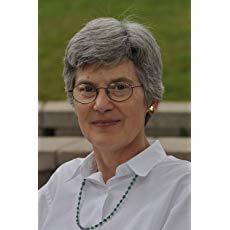
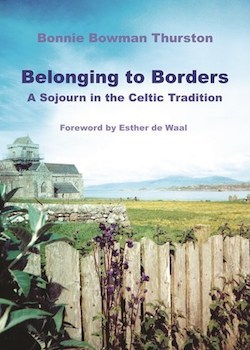
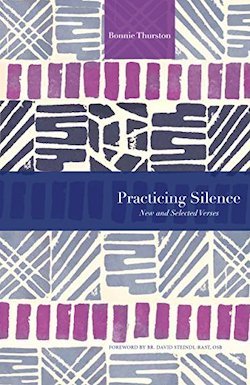
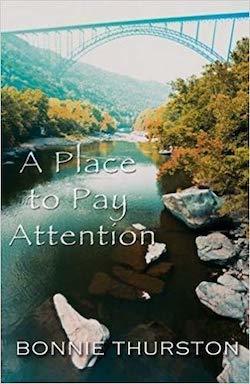
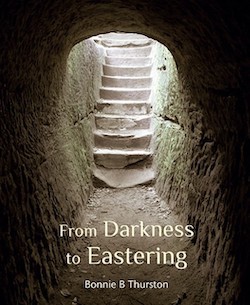

Dreaming of Stones
Christine Valters Paintner's new collection of poems Dreaming of Stones has just been published by Paraclete Press.
The poems in Dreaming of Stones are about what endures: hope and desire, changing seasons, wild places, love, and the wisdom of mystics. Inspired by the poet's time living in Ireland these readings invite you into deeper ways of seeing the world. They have an incantational quality. Drawing on her commitment as a Benedictine oblate, the poems arise out of a practice of sitting in silence and lectio divina, in which life becomes the holy text.

September 9, 2019
The Soul's Slow Ripening DVD now available!
In Fall 2018 Christine Valters Paintner released her book The Soul's Slow Ripening: 12 Celtic Practices for Seeking the Sacred which has been really well received as a wonderful resource to break open Celtic spirituality for the contemporary seeker.
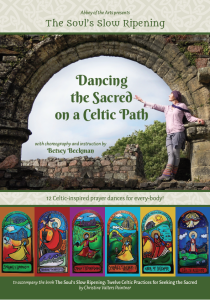 We followed that book up with our second album, The Soul's Slow Ripening: Songs for Celtic Seekers (available from CDBaby as a digital download or CD), which includes twelve songs from wonderful musician friends to deepen your experience of Celtic tradition and prayer.
We followed that book up with our second album, The Soul's Slow Ripening: Songs for Celtic Seekers (available from CDBaby as a digital download or CD), which includes twelve songs from wonderful musician friends to deepen your experience of Celtic tradition and prayer.
We are delighted to announce we now have our DVD available, The Soul's Slow Ripening: Dancing the Sacred on a Celtic Path (available as a DVD or video streaming), with dances and gesture prayers to accompany each of the songs created by Betsey Beckman, one of our wonderful teachers and Wisdom Council members.
And you can find all of the dancing monk icons that artist Marcy Hall created of our Celtic monks and mystics at her Etsy shop (prints available).
At Abbey of the Arts we delight in offering creative resources for the spiritual journey. Reflect, sing, dance, and pray with all of your senses on the Celtic way!



